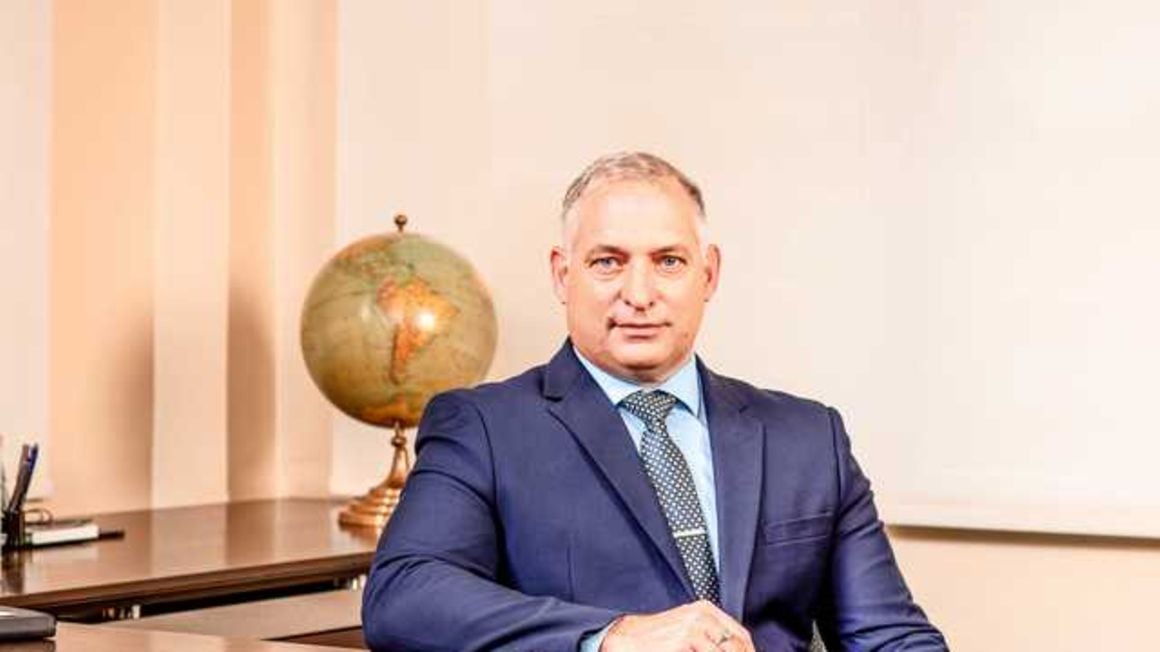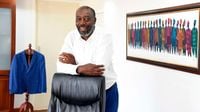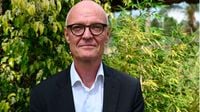
Alan Adlington-Corfield, the Executive Head of School at the M-Pesa Foundation Academy. PHOTO | POOL
Only plebeians became teachers during the period Alan Adlington-Corfield grew up in apartheid South Africa.
There was no honour in teaching, but Alan swam against this tide to become not only a teacher but also a much more studious and accomplished teacher of mathematics.
He believes all this was prophesied because during a Bible study group in his early 20s when someone sagely placed a hand on their shoulder and said gravely, “I had a vision that one day you will travel abroad and you transform the lives of young people.”
Alan Adlington scoffed. But it has come to pass seeing as he, as the Executive Head of School at the M-Pesa Foundation Academy, is transforming the lives of thousands of underprivileged children.
Alan reflects on all these as he turns 50 next month.
Any parting shots from your 40s as you turn 50?
I’m honestly ambivalent about it. It’s an interesting time in one’s life, it seems to cause deep reflection. I don’t know why, because it’s such a significant number but it doesn’t seem as old as it used to. When I was younger, I always thought 50 was old.
Thirty was ancient.
(Laughter) Now I’m thinking 50, life has just begun. I think it’s a little bit like a milestone. You start thinking about what you have achieved in your life and what the future holds.
I’m proud that I have not been complacent in my life. I’m proud of what I’m doing now because it’s such a unique type of work, I’m fulfilling a life’s purpose and it’s wonderful to be in such a deeply significant place in your life, in your career. It’s deeply fulfilling.
Did you ever see yourself here, doing this?
At one point I may have imagined it. When I was in my 20s, I belonged to a Bible study group and someone came to me in one session and said, I had this vision about you, and that you’re going to travel abroad and transform the lives of young people.’ I thought they were crazy. I was like yeah, you’ve got the wrong person (Chuckles) and I never thought about it since.
I spent pretty much my entire life in South Africa. I’ve never worked abroad until this position here so maybe that was the prophecy. My journey in South Africa was perhaps fairly typical in terms of education although being very driven to succeed.
I started as a mathematics teacher and then moved into being the head of the department in two different schools.
Then on to management, a senior academic head of school, deputy head of school, to head of school. But I never until recently thought about leaving South Africa or working with students that are also deserving.
And I probably reflected on it a couple of years ago, and I thought what is my next step? And of course one also as an educationist, as a teacher, you have to make a living. We’re not wealthy people, you know?
(Chuckles) So you always think, if those are the kind of students I’m gonna work with I’m gonna have to look hard to find something that can still sustain a family.
I was deputy head at a school in South Africa’s second most expensive school. An all-boys boarding school. So in quite a big way moving here and working with the type of students we have here is quite different. Quite a jump, quite a change, which has been the deeply fulfilling part.
Having been a scholar for a great part of your adult life, what have you learnt from your students?
As a teacher, you’re always a learner otherwise you’re not a very good teacher. Teaching is learning. The biggest thing about being a really good teacher is about putting yourself in their shoes and their position. Very early on in my career, I assumed I knew it all and I was just there to give and not to receive. And you very quickly learned that to be a really good teacher you need to be learning from your students as well.
Particularly if you’re a teacher of mathematics. You’d be surprised at how a math classroom changes your perspective of a human being, of a person. How they grapple with something, and how they cope with failure. And those were all learning lessons for me as well. I’ve learnt not to judge a book by its cover, children surprise you.
But also I think something I've learned more recently, particularly in South Africa was to be conscious of the unintentional biases that we have through how we’re raised. I was raised in a South African home during apartheid, maybe that’s why I think the way I do without even knowing it. That subconscious and conscious bias. So I think students have taught me to confront that.
What do you remember from your childhood during that time?
I was born in the 70s and grew up in the 80s and 90s on the eastern coast of South Africa, which is near where Nelson Mandela was born. We then moved to the Western Cape, so most of my life was actually near Cape Town. I had two very different parents.
My mother is very liberal, very much about equality and human rights. She was a teacher and a great inspiration to me, a lady with a big heart. She’s retired now. Through her, we felt the injustice of apartheid. My father was on the other extreme. He even worked, for some period, for the South African Secret Service and was a supporter of the National Party and wished for the status quo to continue. He had some very racist perspectives on things. And it’s very challenging as a young man because you’re always looking for your male parent to be your role model.
There was a lot of propaganda, particularly in the media and my father would say that’s the reality while my mother was quietly telling us — because she didn’t want to be disobedient — hold on, here is another perspective. I’m grateful because it moulded very much my perspective on all humans, never mind South Africa and apartheid, but my view of everyone. But those two conflicting messages from my parents created a real dichotomy and a real challenge as a young person. It created confusion.
Have you ever had a conversation about that with your dad?
No. He died when I was 24 years old. Interestingly between 18 and 24, we clashed because I had my strong views and perspectives and that didn’t go well so much so that there was very little relationship by the time he died.
Alan Adlington-Corfield, the Executive Head of School at the M-Pesa Foundation Academy. PHOTO | POOL
How’d he die?
Cancer. A lot of people often say to me, aah you’re gonna regret that you didn’t mend things with your father before he died. And I took real offence to that because I tried. There were times when I extended an olive branch but it was not accepted. People have this perspective that as a child you should have made things right before your father died, and I sat back and I thought, well we should have met in the middle before he died. That would have been great.
(Chuckles) It’s interesting how that also moulds your character and psyche as you work through that. I think a parent dying before you resolve things is always gonna leave some issues in your life. And it took me a very long time to rationalise and put the relationship where it needed to be. I think my father drove me to be successful because he was angry that I chose to teach as a career.
Why is that?
In South Africa in the 90s, but probably still to a degree today, teaching is seen as a very lowly occupation.
Teachers are not revered. I was a bright student and my father wanted me to be a doctor or engineer. So I studied chemical engineering at the University of Cape Town but after two years, I looked at what the final year students were doing and I thought that’s not the life I want, that's not me.
So I switched degrees at that stage, and my father was very angry, he stopped paying for my degree and I took out a student loan for the rest of my studies. The irony here is that even though he was so upset when I then became a teacher, he married a teacher. (Chuckles). One time over dinner he said, “Arrgh, I can’t believe you decided to become a teacher. I wish you were like your friend Paul.”
Paul was a chartered accountant. This statement was so damaging to me because I wanted him to be proud of me. I think from that point forward I thought okay, I’m a teacher but I’m gonna be the very very best teacher he has seen. I think as a mathematics teacher I produced some of the best results in South Africa because I kept pushing myself to be the very best. I think there was that underlying thing that I must please my father. I must show him that being a teacher is okay and I can still be successful in life. And I think it’s taken many years to balance that and recognise what’s healthy and what’s not.
What has Math taught you about life?
Sometimes we have very challenging problems to solve, and on the face, it seems insurmountable, but actually, if we take a step back, and we look at them piece by piece, we can usually find a solution. And at some point, we look back and say the problem wasn't as bad as we thought it was.
What’s been the biggest challenge you've faced in all your 49 years?
[Pause] I think about my relationship with my father and its subsequent impact. For years I didn’t address it and I think it affected how I taught and operated at work, in my family environment, my relationships with my wife, and my children. And solving that kind of problem — a problem of the heart, the mind, a problem of who you are — can be tougher than solving any practical problem. I think having the courage to do that was my biggest huddle. To face me head-on.
And it's difficult I think to be of huge benefit to others until you do that in your own life.
What are you looking forward to in your 50s?
Wow. I think career-wise, more of what I’m doing right now, that’s impacting young people's lives, impacting teachers’ lives, through a certain style of leadership. Which is quite different from what we see at the top leadership. But personally, very much in the personal space is watching my young children become incredible adults and confident ones. And perhaps trying to be more of the father that I perhaps wish I had, and seeing the fruits of that. So watching them settle down, get married, have children, careers, I think that's what I'm looking forward to.
How old are they?
All in their 20 — 21, 22, and 26. And my middle daughter she’s 22, she’s just graduated as a teacher and just landed her first job in January as well. So a proud moment particularly that she’s gone into teaching as well. Watching that next generation and being a part of it is a big thing for me now, continuing to have a good influence in leadership. I spend a lot of time pondering when I think there’s an African leadership crisis. There’s a space where the leader needs to be invisible. If we look at someone like Nelson Mandela, there are some very obvious examples there. And I think humility is so important to leadership, rather than egocentric leadership.
Can you learn to be humble or is it inborn?
I think it is possibly a character trait you’re born with but it's something you can practice. But will you be willing to practice? That’s the thing. I don't think enough people and leaders are deeply reflective enough and honest enough in many cases, not all cases, to want to practice that humility.
If your life was to end at 6.05 pm today, what would be your greatest regret?
(Pause) I think my greatest regret would have been not being more honest sooner in my life about who I am. Because the consequences of that honesty were just very far-reaching in terms of my ability to impact people, students, staff, family and my children. And I think being honest with who you are, what you are, sets you free in a way, so I think, a far more genuine and enriching relationship with the people around you. And I regret that it didn't happen sooner.
Tell me about that unique ring on your finger.
This is my family ring, our family crest. There are only two of these rings. My son has the other one. It speaks to our heritage and who we are as a family. My great-grandparents arrived in South Africa in 1820, we’re very proud of that. He’s so proud of it saying we’re a family and we believe in this. Not many people know this but my son is adopted. He is my wife’s son, but I met her when he was about eight months old.
Oh yeah?
Yeah, and I subsequently adopted him. And we’ve always told him that. And he’s met his biological father and so on. But we’ve had such a strong relationship and we’ve always both sort of believed being a father is very different from being a biological father. Being a father is about being a strong positive role model, a male role model. It’s a nurturing that you give that child. It’s respect and dignity for others that’s so important and that defines us as men in this family.
So the ring is obviously symbolic in terms of the bond that you guys have.
Is there another symbol that also connects you with your daughters?
Hhm. That’s a very interesting one. Maybe I like rings but my daughters and I also got another ring that just has our initials on it — AC. But we also have very different connections and it’s interesting the type of relationship you have with your different children. And maybe it’s not a gender or a personality thing.






No comments :
Post a Comment